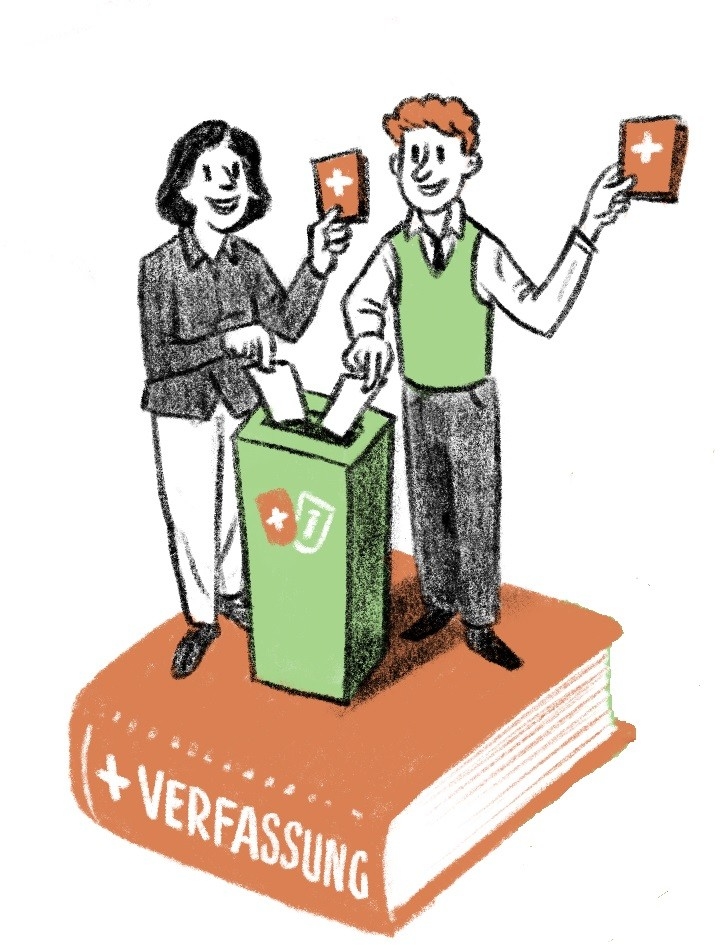Co-determination & naturalisation
Would you like to have a say in Switzerland? Would you like to play an active role in society? In many forms, this is also possible without a Swiss passport. You receive full political rights with naturalization.
Co-determination and active shaping
In the canton of St.Gallen, foreigners are not allowed to vote or elect a person.
But you have the right to petition the authorities. Petitions can contain suggestions, complaints or requests. In addition, participation in commissions and working groups of the municipality of residence is possible.
In addition to political participation, you can actively shape life in your environment by working in an association or other organization. Get involved where your interests lie!
Some examples of where you can get involved:

- Integration projects
- Genossenschaften
- Clubs
- Family Centres
- cultural organisations
- Volunteer fire brigade new window
- Municipal commissions and working groups
Naturalisation
Naturalisation is the last step on the path to integration into a life in Switzerland. If you are naturalized, you can vote and be elected.
Switzerland recognises dual citizenship. Anyone applying for Swiss citizenship does not lose their previous citizenship, unless their country of origin does not allow dual citizenship.
Naturalisation procedure
There is the ordinary naturalisation procedure and the simplified naturalisation procedure. The latter is primarily intended for people who have Swiss family members.

When can an application be submitted?
Federal law requires at least 10 years of residence in Switzerland. Of these, you must have lived in Switzerland for 3 years during the last 5 years prior to the submission of the application.
The time that someone between the ages of 8 and 18 has lived in Switzerland counts twice, but the actual residence must be at least 6 years.
Furthermore, the applicant must have lived continuously in the Canton of St.Gallen and in the political municipality of residence for the last 5 years.
Under what conditions?
Citizenship is only granted to persons who:
- participate in economic life or acquire education
- Promote the integration of family members
- know the local living conditions well (show interest in public events, know about the geographical, historical, political and social conditions)
- respect the values of the Federal Constitution and expressly commit themselves to them
- do not endanger Switzerland's internal and external security
- have a good knowledge of German, at least the reference level B1 (oral and written)
- live in orderly financial circumstances
How much does ordinary naturalisation cost?
The costs vary considerably depending on the municipality of residence and canton. On average, the costs look something like this:
Municipality of residence: between 500 and 1000 francs per person
Canton: up to 2000 francs per person
Federal level:
- Couple with or without minor children: 150 francs
- Single person with or without minor children: 100 francs
- Minor individual: 50 francs
There may also be costs for the documents required for the required documents (confirmation of residence, extract from the criminal record, Betreibungsregisterauszug , etc.).
How do you have to proceed?
You can obtain an application form from the naturalisation council of the municipality of residence. You must then submit the necessary documents in full to the naturalisation authority of your municipality of residence.
The Naturalisation Council examines the application with regard to the formal and substantive requirements for naturalisation. If you meet all the conditions, you will be granted municipal and local citizenship.
There are naturalisation authorities that will take you with a written or oral test in which you will test your knowledge of Switzerland.
A naturalisation procedure can take very different lengths of time, ask the municipal office.
Who can submit an application?
- the spouse of a Swiss citizen
- the child of a Swiss citizen
- a person under the age of 25 from a foreign family who is in 3. generation lives in Switzerland
- a minor stateless child
- a person who has lost their Swiss citizenship (e.g. by marrying a foreign person)
When can an application be submitted?
The length of stay in Switzerland varies from case to case. The federal authority is responsible for the decision.
Under what conditions?
To do this, they must be successfully integrated, which means:
- You observe public safety and order (e.g. you have no tax arrears, no debt collections, no certificates of loss or no criminal records)
- They respect the values of the Swiss Federal Constitution
- in everyday life, you can communicate in written and spoken language in a national language
- You participate in economic life or the acquisition of education (e.g. you have not received social assistance in the last 3 years before the application or you have fully refunded the social assistance received)
- promote the integration of your family members and support you
How much does facilitated naturalisation cost?
The costs vary depending on age:
- 250 francs for minors under 12 years of age
- CHF 650 for minors aged 12 and over
- 900 francs for adults.
The total amount must be paid in advance and will not be refunded if the application is rejected.
How do you have to proceed?
The application must be submitted to the Staatssekretariat für Migration SEM on the official form. You can request the form by e-mail (ch@sem.admin.ch) and you will need to provide your exact postal address to which the form should be sent.
A simplified naturalisation procedure takes an average of 1.5 years.
Self-Check Naturalization
Find out in just a few clicks whether you meet the most important criteria for simplified naturalisation.
Contact points
Enter your postcode so that we can show you your nearest contact point.
